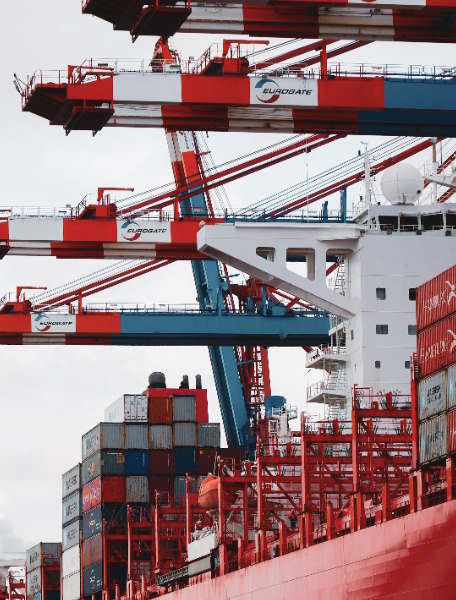Procurement transformation at a seaport operator
Developing procurement into a value-added partner in the company
In a comprehensive transformation project, we helped a leading European port operator to reorganise procurement, cross-functional interfaces and introduce powerful new tools and methods.
Logistics & Infrastructure
Objective
An initial procurement optimization became a three-year project in which we achieved a full-scale transformation of the operational supply chain together with the client. In addition to organisational development, the cross-functional optimization of processes, the implementation of a roadmap for digitalisation, change management and the implementation of a comprehensive risk management system were on the agenda. The project finally ended in the restructuring of numerous functional areas, as well as the development of a newly developed asset management concept.
Approach
We started the project with the aim of strategically aligning procurement. However, it quickly became clear that efficiency losses were mainly in the interfaces to other departments and that potential could not be fully exploited as a result. Together with the company’s procurement department, we promoted cross-functional cooperation, defined new cross-functional processes and changed roles and responsibilities so that they now harmonise perfectly with the newly created strategic aspiration of procurement.
To promote the necessary change in awareness, we implemented a professional training concept, complemented by change management workshops and personal coaching. These measures quickly bore fruit; important success factors were:
- Unrestricted support from management and procurement management
- The ability of our consultants to adapt to an industry environment that was rather traditional and critical of change
- Convincing methodology and quick sense of achievement
- Proof of the strategic concept through significant savings achieved quickly
A key example of success was the procurement of numerous Van Carrier, an elementary investment for the company. By redefining the CAPEX process, adapting the technical specifications and involving all parties across functions, high savings were achieved. In addition, the new processes made it possible for the first time ever to bundle procurement volumes across different ports, despite different technical requirements.
The introduction of professional working capital management also brought very good results. The adjustment of payment terms from more than 50 different terms to four standard terms has significantly reduced the complexity of the issue and generated further optimizations.
In order to efficiently implement the newly defined structures and processes, we introduced a digital system with procurement that covers the entire purchasing cycle from budget planning to invoicing. We supported procurement throughout the entire process, from the initial process analysis, to vendor selection, to implementation in the organisation. In cooperation with other corporate functions such as IT, finance and operational units, an IT service provider was selected to implement a lean and uniform process landscape covering all interfaces.
During the project, the Corona pandemic created new challenges. For the management of the port operator, the topic of risk management moved to the top of the agenda. We implemented a customised risk management system to achieve transparency about possible risks in the company and thus achieved an optimization of supply chain stability.
The successes achieved ultimately led us to reorganise and realign other departments outside of procurement. We closely supported the client in implementing, communicating and realising the changes. Our customer-specific change management approach made it possible to overcome resistance and realise the planned successes. A newly developed asset management concept rounded off the success of the project.

Results
- High-performance processes with clear allocation of roles and responsibilities
- Technical and cross-functional optimization of interfaces
- Digitalisation of the supply management cycle
- Introduction of effective risk management
- Successfully implemented training and coaching programme
- Optimized working capital through adjustment of payment terms
- Redesign and further development of departments outside procurement
- Development and implementation of a professional asset management concept

